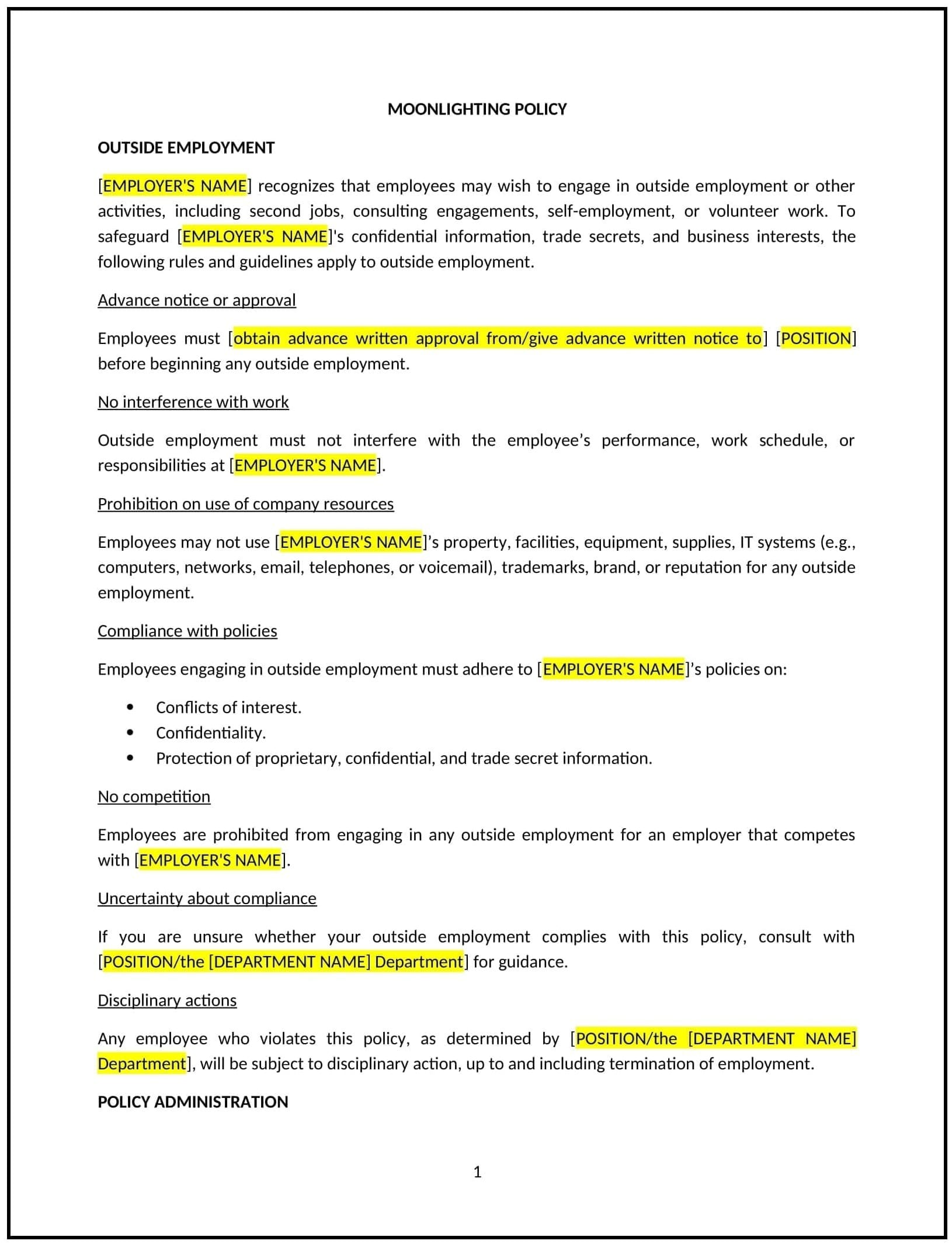Got contracts to review? While you're here for policies, let Cobrief make contract review effortless—start your free review now.

Customize this template for free
Moonlighting policy (Mississippi)
A moonlighting policy outlines the guidelines for employees engaging in secondary employment, or "moonlighting," while employed at the company. This policy is designed to address potential conflicts of interest, ensure employee performance is not impacted, and clarify the boundaries for outside work. It also promotes transparency and helps maintain the integrity of the workplace while respecting employees' right to pursue additional income or personal interests.
By implementing this policy, businesses can set clear expectations about outside employment, safeguard their operations from conflicts of interest, and ensure that employees understand the company’s position regarding secondary employment.
How to use this moonlighting policy (Mississippi)
- Define moonlighting: Clearly define what constitutes moonlighting, including any secondary employment, freelance work, or business activities outside the company.
- Set limitations on outside employment: Specify any restrictions or conditions that apply to moonlighting, such as prohibiting work with competitors or requiring disclosure of certain types of secondary employment.
- Ensure no conflict of interest: Emphasize that employees must not engage in any secondary employment that could create a conflict of interest with the business, damage its reputation, or negatively affect their job performance.
- Maintain performance standards: Establish that moonlighting should not interfere with the employee’s ability to perform their primary job duties effectively and on time.
- Require disclosure: Employees should be required to disclose any moonlighting activities that may potentially conflict with the company’s interests. Encourage transparency, especially when the secondary job might overlap with the employee's duties.
- Assess requests on a case-by-case basis: Consider each moonlighting request individually and assess whether the secondary job creates any conflicts or violates company policies.
- Address non-compliance: Specify that failure to adhere to the moonlighting policy may result in disciplinary action, up to and including termination.
- Review and update the policy regularly: Review the policy periodically to ensure it remains relevant to the evolving needs of the business and any legal or industry changes that may affect the policy.
Benefits of using this moonlighting policy (Mississippi)
This policy offers several benefits for Mississippi businesses:
- Mitigates conflicts of interest: The policy helps businesses prevent potential conflicts between employees' secondary jobs and their primary responsibilities, protecting company interests.
- Maintains productivity: By ensuring that employees' outside employment does not interfere with their job performance, businesses can maintain a high level of productivity.
- Clarifies expectations: It sets clear expectations for employees regarding outside work, reducing misunderstandings and potential legal disputes.
- Promotes transparency: Encouraging employees to disclose their secondary employment fosters an atmosphere of openness and trust.
- Protects company reputation: The policy safeguards the company's reputation by ensuring that employees do not engage in secondary work that could harm the business or its image.
Tips for using this moonlighting policy (Mississippi)
- Communicate the policy to all employees: Ensure that the policy is clearly communicated to all employees, either through employee handbooks, onboarding, or other formal communication methods.
- Provide clear guidelines on disclosure: Make sure employees understand the importance of disclosing any secondary employment and the types of activities that may require approval.
- Be consistent in enforcement: Apply the policy fairly and consistently, ensuring that all employees are held to the same standards when it comes to moonlighting.
- Monitor employee performance: Ensure that moonlighting is not negatively impacting employee performance, and encourage managers to provide feedback if secondary work is affecting productivity.
- Address issues promptly: If an employee's moonlighting activities are causing problems, address them promptly to avoid larger issues that could affect the business or employee relations.
- Review the policy regularly: As the business evolves, review the policy regularly to ensure it remains effective in managing moonlighting and aligned with business needs.